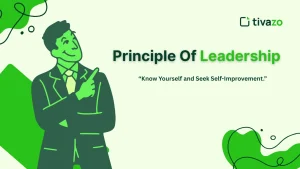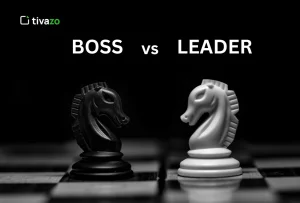What transforms a leader from excellent to unforgettable? It is not other than leadership effectiveness. It is the key component behind thriving teams, greater output, and long-lasting impact. Many leaders, however, are still using antiquated techniques.
Leadership success is about influence, vision, and trust rather than titles or control. Employees want leaders who listen, change, and inspire in the fast-changing workplace of today. Knowing how to raise leadership effectiveness is essential for creating closer relationships and achieving actual results, whether you’re running hybrid, remote, or in-office teams.
As companies undergo fast development, leaders need to meet the challenge with strategic thinking, empathy, and candor. This blog will walk you through the fundamental characteristics of good leaders, practical techniques to improve your leadership abilities, and why developing leadership competence is vital for corporate success in 2025. Transform the way you lead, one intelligent decision at a time.
Key Highlights:
- Qualities of Effective Leaders
- Steps To Improve Leadership Effectiveness
- 5 P’s of Effective Leadership
- How to Improve Leadership Effectiveness in the Workplace
What is Leadership Effectiveness?
The capacity of a leader to get results while inspiring and motivating others is known as leadership effectiveness. It entails leading teams or people toward common objectives using integrity, flexibility, and intentional direction. Good leadership strikes a balance among inventiveness, emotional intelligence, communication, and performance.
A highly effective leader:
- Motivates and inspires
- Gains credibility and confidence.
- Speaks distinctly
- Makes knowledgeable judgments.
- Promotes accountability and development.
The core of leadership effectiveness rests in the capacity of the leader to relate to their team, coordinate actions with values, and create significant results.
Qualities of Effective Leaders
To understand how to improve leadership effectiveness, we must first identify the traits that set exceptional leaders apart:
1. Emotional Intelligence (EQ)
Leadership efficiency depends on emotional intelligence, among other essential components. Leaders with EQ read the room, remain composed, and approach difficult conversations sympathetically. This fosters closer relationships and forms a team that respects and feels safe.
Read More: Emotional Intelligence Training: 7 Best Positive Strategies
2. Integrity
Leadership effectiveness begins with trust, and honesty starts with trust. Excellent leaders mean what they say and do what they promise. People follow with conviction when they see such honesty.
3. Visionary Thinking
A leader must transcend the here and now if they want to improve their leadership effectiveness. Visionary leaders have a clear aim and broad-picture thinking that helps their staff. They persuade others that a better future is possible and how to get there.
4. Adaptability
Fast change is happening, and how well a leader adjusts determines his or her effectiveness. Good leaders remain adaptable and assist others in adapting without alarm. Plans change; hence, they remain cool and discover fresh ways.
5. Communication Skills
Leadership effectiveness depends on excellent communication. It’s about listening, questioning, and providing direct comments rather than simply giving instructions. Leaders who talk with care make their staff feel heard and understood.
6. Accountability
Leadership effectiveness shows when leaders take action. They solve issues and hold themselves and other people to great standards rather than pointing fingers. This fosters a culture in which everybody gives their best.
These traits create the foundation for consistent, high-impact leadership effectiveness.
Steps To Improve Leadership Effectiveness

Looking to improve your leadership effectiveness in 2025? Here are strategic steps you can take:
1. Identify and Develop Your Strengths
Begin by knowing what you already do well if you want to learn how to increase leader efficiency. Tools such as CliftonStrengths or Birkman offer an exact understanding of your inherent skills. Using your talents every day, once you recognize them, will help you to be an honest leader whom others would follow and trust. Real leadership effectiveness starts there.
2. Invest in Emotional Intelligence
You can’t become a better leader without emotional intelligence. Self-reflection helps you see how you react under pressure, and input from others reveals areas for development. Really listening—that is, with empathy—swiftly creates trust. Leading is one of the quietest yet most strong approaches.
3. Enhance Communication Skills
Wondering how to improve leadership effectiveness? Start talking—and listening—better. Simple, straight check-ins keep your team on course. And if you really want to inspire, try storytelling. Sharing true stories strengthens the team bond and helps your message stick.
4. Recognize and Reward
Say thanks; it’s straightforward and effective. Acknowledging effort improves leadership effectiveness by means of morale enhancement and ongoing motivation. Connect your appreciation to team values so individuals feel seen, not only for results but also for how they arrived. That’s lasting leadership.
You May Also Like: How to Choose and Reward an Employee of the Week: Boost Morale and Productivity
5. Support Career Development
Interested in knowing how to foster loyal teams and enhance leadership effectiveness? Help your people grow, too. Create basic job routes, provide learning resources, and follow their progress. A leader concerned with the future creates a team ready to give their all right now.
6. Lead with Integrity and Vision
When you lead with honesty and purpose, leadership effectiveness flourishes. Lead the sort of leader who shares events, good or bad. Live your vision, articulate it, and make your team feel as though they belong. That is how great leaders create a powerful culture.
7. Create a Feedback Culture
Feedback doesn’t always need to be intimidating. Making it normal really aids in raising leadership ability throughout. Request feedback; offer it frequently; treat it as a tool, not a weapon. Trust develops more when feedback goes two ways.
8. Encourage Innovation
Managing is not the only thing leadership efficiency is about; it is also about imagining. Allow your team to offer fresh ideas, even the disorganized ones. Cheer for creative thinking, encourage calculated risks, and allow room for innovation. That’s how to increase leadership effectiveness in a contemporary, fast-moving setting.
Learning how to enhance leadership effectiveness in the fast-paced businesses of today depends on these procedures.
5 P’s of Effective Leadership

The 5 P’s provide a practical framework to enhance leadership effectiveness:
1. Purpose
The core of leadership efficiency is purpose. Once you know your “why,” leading with purpose and clarity becomes simpler. Leaders have changed teams just by linking daily chores to a grander purpose; people become energized when their work counts.
2. People
Leadership effectiveness is fundamentally about people, not just meeting quotas. Constructing genuine connections and elevating others fosters trust and loyalty. Focusing on people first causes results to follow naturally; it’s a basic yet potent change.
3. Passion
Passion is contagious and inspires leadership efficacy. Your team picks up your energy as you show enthusiasm and faith in what you do. I recall a leader whose passion made even difficult assignments seem feasible; that’s the power of fervent leadership.
4. Performance
Effective leadership is about striking a balance with outstanding results. Driving performance calls for well-defined objectives, thorough preparation, and accountability for everyone. But never forget empathy—people do their best when not under duress but rather when supported.
You May Also Like: Performance Benchmarking: Top 6 actionable steps
5. Persistence
Good leaders are distinguished from great ones by perseverance. When you persevere in spite of obstacles, leadership effectiveness sparkles most brightly. I have had difficult moments, but demonstrating perseverance and constant concentration enabled my staff to believe we could overcome.
When integrated, these 5 Ps supercharge your leadership effectiveness.
Why Leadership Effectiveness Is Critical to Organizational Success?
Leadership effectiveness is not just a personal asset, it’s a business necessity. Here’s why:
- Higher Employee Engagement: Effective leaders have groups that are more engaged and productive, according to Gallup research.
- Increased Retention: Employees stay longer under respected and trusted leaders.
- Improved Innovation: Good leaders encourage a culture of safety and innovation.
- Better Decision-Making: Strong leaders assess hazards and coordinate activities with strategic objectives, therefore improving decision-making.
- Revenue Growth: Effective leader-driven organizations constantly outpace their rivals.
When leadership effectiveness is prioritized, the entire organization thrives, from bottom-line results to employee happiness.
How to Improve Leadership Effectiveness in the Workplace?

Here are workplace-specific tactics to boost leadership effectiveness:
1. Conduct Leadership Assessments
Begin by understanding where you are if you wish to increase leadership effectiveness. Tools like 360-degree assessments provide you with candid input from all directions—peer, supervisor, even your own team. Considering these comments and acting on them enables you to advance more swiftly and lead more confidently.
2. Offer Leadership Training Programs
One of the most brilliant means to improve leadership effectiveness is by investing in leadership development. Webinars, courses, and workshops keep your skills fresh and sharp. I recall signing up for a leadership webinar that totally altered my approach to team disagreements—constant learning really helps.
You May Also Like: Team Building for Leadership: 5 best approaches for teams
3. Promote Psychological Safety
In a secure environment where everyone is empowered to speak up, leadership effectiveness prospers. Setting this sort of atmosphere requires making sure every voice counts and promoting frank conversations. People bring their greatest ideas to the table when they are aware they won’t be criticized—and that’s gold for any leader.
4. Set Clear Expectations
The foundation of leadership effectiveness in the company is clear expectations. Specifying duties and responsibilities guarantees that no one is left unsure of what to do. Work runs more easily and results get better when everyone’s objectives align with the larger team and corporate vision.
You May Also Like: Clear goals for Success: 6 Key Strategies to set for employees
5. Model Work-Life Balance
Effective leaders realize leadership means considering the whole of life, not only their jobs. Respecting when your employees are free and allowing flexibility shows them you care about them. Once I set limits on the hours I worked, the whole team was able to work better and feel better.
6. Celebrate Wins Publicly
If you want your leadership effectiveness to improve, follow the advice in this guide. Mark the successes of your team with full enthusiasm. Any recognition from the public motivates people to keep going. A quick “well done” given in front of others can really boost our motivation and create a positive atmosphere on the team.
7. Mentor and Coach Regularly
Being a good leader means helping new employees succeed by offering them advice. Personal meetings with a coach help you develop in ways that group sessions often do not. Having regular talks with my mentor opened opportunities for me and taught me how to become a better leader.
When these practices are used in the workplace, leadership can be improved fast, and your team’s results can be sharpened.
You May Also Like: Mental Health in the Workplace
Conclusion
Leadership effectiveness not only sounds good, but it is a real skill that produces achievements. By 2025, having staff who work remotely, operate in agile teams, and come from different generations will make strong leadership essential.
Developing emotional intelligence, matching purpose, helping your team, and acting with honesty will support you and your organization for years to come.
After learning how to make your leadership better, start applying these approaches. Always have a purpose, hear people with empathy, and constantly learn new things. Taking care of your health now will make things easier for you and your team in the future.
What is an effective leader?
An effective leader is someone who inspires, guides, and empowers others to achieve common goals. They lead with clarity, empathy, and accountability—driving strong results and building trust along the way. Leadership effectiveness is all about creating impact through action, vision, and connection.
What enables a leader to be effective?
A leader becomes effective through a mix of emotional intelligence, clear communication, integrity, adaptability, and vision. Consistently practicing these traits builds trust, motivates teams, and boosts leadership effectiveness across the organization.




